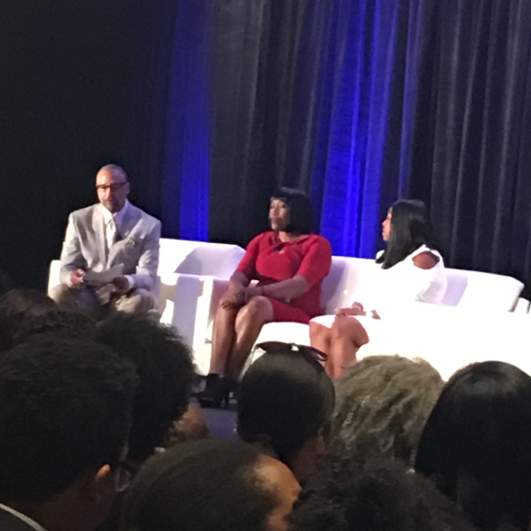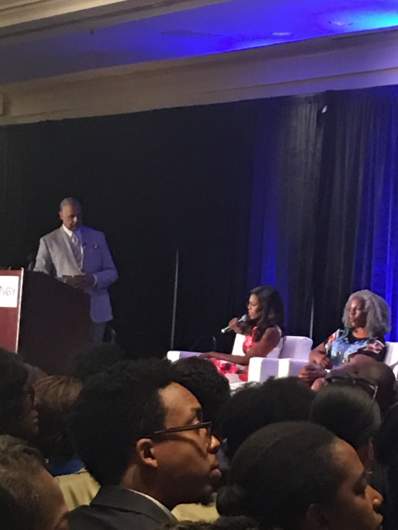Omarosa Manigault-Newman’s appearance on a panel at a black journalists’ convention in New Orleans almost immediately degenerated into an intense encounter with the moderator, Ed Gordon of Bounce TV. You can watch video of the panel above and below from Heavy, which was at the panel event.
Omarosa’s controversial appearance occurred immediately after an emotional conversation with the mother of Philando Castile and aunt of Alton Sterling. Both men were shot and killed by police last year.
Here’s a closer view of the opening moment:
Here’s another tense moment:
Manigault appeared on a panel discussion focused on police shootings and brutality issues, and her last-minute inclusion caused controversy even before she entered the room. The former Apprentice contestant now works in the White House Office of Public Liaison.
The Omarosa appearance came at the National Association of Black Journalists’ annual convention in front of a room full of reporters and others from around the country. Before the panel unfolded, Page Six reported that the addition of Omarosa to the discussion was causing “heavy drama” at the conference. According to Page Six, New York Times reporter Nikole Hannah-Jones and Jelani Cobb of the New Yorker backed out of the panel, and Ed Gordon of Bounce TV agreed to step in to moderate it. Cobb told Page Six that she didn’t just back out because of Omarosa’s inclusion in the panel but also because “it was unclear whether we would be able to discuss substantive issues regarding the administration and its policing policies. Also, the panel was very disorganized, and basic things like format were not clear.”
Gordon addressed the controversy from the stage, and, at times, laughter could be heard when Omarosa’s name was mentioned, something Omarosa pointed out later from stage. At other times, some audience members vocalized their displeasure with Omarosa in different ways. Some turned their backs to Omarosa as she spoke. She did say at one point that Trump’s comments on police were not appropriate but then generally didn’t answer questions about him.
Journalist Roland Martin later tweeted criticism of how it all went down, including an apology to the mother and aunt of men killed in police shootings, who were on the panel right before Omarosa.
When Omarosa eventually took the stage, the conversation immediately grew heated. She was asked about the Trump administration’s policies on policing, and, at one point, said she couldn’t share private conversations with the president. She started out the panel by outlining those she had personally lost to violence, including her own father, brother and seven of her high school classmates. Then, Gordon asked her about the Trump administration and her seat at the table there. At one point, a video of Trump speaking played on the screen in which the president spoke about how he doesn’t want police to “be too nice. Like when you guys put somebody in the car when you’re protecting the head…like don’t hit their head when they just killed somebody. I said you can take the hand away.”
Here’s more video from the panel:
“Are you suggesting I should walk away?” Omarosa said to Gordon at one point. “We have to have a voice at the table.” At another point, she told Gordon, “Don’t be aggressive,” and stood up from her chair. “You’re dismissing my family story… and the other thing you did is call this a mess,” she said as Gordon tried to ask questions. “I’m doing my best to keep this as civil as possible,” Gordon said.
“Ask your question and don’t lecture me,” Omarosa said, accusing Gordon of “dismissing my family story” by switching questions to Donald Trump.
“I’m suggesting that the way this was put together became a mess,” Gordon said at the end of the event. “People started to drop out because they didn’t want to participate in it because they thought it was going to turn into exactly quite frankly what it is turning into,” he said at another point. “It is a mess,” he retorted to Omarosa at one point of the panel.
Omarosa and Gordon repeatedly spoke over each other during the panel as he tried to ask questions, especially about Trump’s policies and comments regarding police and the African-American community. She said she couldn’t disclose private conversations with Donald Trump.
She said at one point that the community’s concerns “have to be addressed.”
The panel started with an emotional discussion with Valerie Castile, the mother of Philando Castile, and Sandra Sterling, the aunt of Alton Sterling. Both women’s relatives were shot and killed by police officers a year ago in shootings that sparked mass protests around the country. Police shootings were cited as motivation by perpetrators of later ambush-style killings of police officers.
The conversation with Castile and Sterling started with a standing ovation from the audience.

Heavy.comValerie Castile and Sandra Sterling at the NABJ panel.
“Sometimes it’s difficult to get up in the mornings, but I have to continue to fight for change,” said Castile, whose son’s shooting aftermath was captured on Facebook Live. She said she spends most of her time meeting with police departments and police chiefs in an effort to get changes in policies and procedures.
Of seeing videos of Sterling’s death in Baton Rouge, Sterling said, “I almost died. It was horrible.” The Justice Department opted not to file federal charges in the Sterling death.
“You saw what I saw. You heard what I heard. You felt what I felt. But you said that’s OK,” Castile said, referring to those who believed the officer should not be criminally convicted in her son’s death. Her point was that, even with the scenario playing out on video, that wasn’t enough to lead to a conviction. A jury acquitted the officer in Castile’s death. Philando Castile was lawfully armed and had a permit to carry a firearm, something he told the officer before the officer fired.
“We need the public to rally with us and work with us,” Castile said, adding that people need to use the power of the vote to cause change. “You all know the system is corrupt,” she said at another point during the talk.
“As best we can, we are there, and we are behind you,” Gordon told the women. He said at another point, “We all grieve the loss of another black person to police.”
Omarosa was part of a panel that immediately followed that one at the same event.

HeavyOmarosa joins the NABJ panel.
Gordon told the audience, which filled a packed room, from the start that Omarosa “has requested to not be alone on the stage. She’s brave to go into the lion’s den.” He stressed that things needed to stay civil. However, when she did take the stage, discourse immediately grew heated between Omarosa and Gordon. By the end of the event, Gordon called things a “quagmire.” He said he was trying to keep decorum from the minute he walked in the room.
Omarosa said she was “not going to back down on my story” because some people don’t like Donald Trump. She added that the Justice Department is not part of her White House portfolio. “We need to stop the violence,” she said at another point. “I don’t think any other 7-year-old like myself should have to stand at the casket of their father.”
She added of her life story, “Most people don’t know my background.” As Gordon tried to turn the conversation, at times, to the Trump administration’s policies, Omarosa would, at times, turn the conversation back to her family’s story and tragedies. Other panelists challenged Omarosa a few times, but the panel was mostly conversation between Omarosa and Gordon.